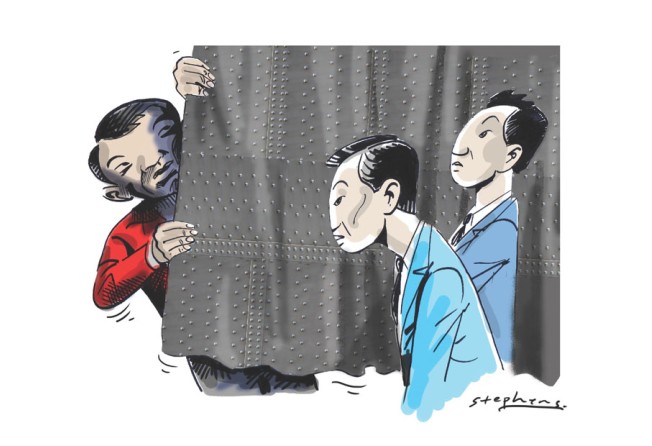China must make friends, not foes, to thrive
Lex Zhao says the emergence of a new cold war mentality, exacerbated by China's military elite, is a growing menace which can be headed off by Asia embracing global and regional co-operation

The release online of a documentary; The Silent Contest, made by the People's Liberation Army's National Defence University, has stirred controversy. It claims that China is being infiltrated and subverted by the US, just as the Soviet Union was before its collapse.
This is in marked contrast to China's international appearance, where leaders have repeatedly said they do not seek hegemony. Vice-premier Wang Yang, even said that the relationship between China and the US should be "like husband and wife".
So one has to wonder: which is the real China?
With the purchase and refitting of the aircraft carrier Liaoning and the showdowns over the Diaoyu Islands with Japan, where they are known as the Senkaku Islands, China seems to be inviting suspicion or even antagonism from the international community.
Three decades of economic boom have made China the world No 2 in terms of gross domestic product, and many Chinese are feeling very rich and want to take on the world. The new generation of top leaders (mostly former Red Guards) is fuelling the fire against "foreign plots" and "foreign penetration", making good use of their fighting skills learned during Mao's Cultural Revolution: only the great Communist Party leadership can protect ordinary Chinese from suffering foreign humiliation again.
It's time for China to wake up. How many friends - true friends - does it have, either nearby or far away?
Meanwhile, Japan seems to be effectively applying its new pillar of diplomacy, the "arc of freedom and prosperity", forming close ties with India, the Philippines, Vietnam and, recently, even with Russia, through joint meetings of foreign affairs and national defence ministers. We should also mention that Japan has already moved its ground Self-Defence Force headquarters into a US military base, and that the US has deployed F-22 Raptor fighters, Osprey helicopters and patriot missiles all over Japan.
It looks as though the cold war has returned, only that the rival has changed from the USSR to China.
China, on the other hand, seems to be turning inward, bringing back Maoist ideology, cracking down on internet "rumours" and jailing dissidents, making friends only with a few isolated, backward countries. Confronted with such dangerous circumstances, it is time for China to slow down.
A war with Japan would lead to these foreseeable consequences, among others: billions of dollars wasted on weapons build-ups; billions of dollars of capital flight to the US; military personnel taking over power; housing prices in China and Japan tumbling; lives being lost and; US bases remaining in East Asia for the next 100 years.
So how could such a scenario be avoided? For starters, the likes of China, Japan, Korea and Vietnam should see sense: it's absurd to go to war over "being No 1 in East Asia", or over some barren rocks.
In fact, these countries share many cultural traits and customs, and their institutions are all based on a strong central government. Economically, they are the most suitable to form a common market and multinationals have established complicated production chains and marketing networks in the region.
Co-operation not only preserves the peace, it could also lead to unlimited opportunities for all to share markets, natural and human resources, management and governance know-how.
If - like with the European Union and the North American Free Trade Agreement - China, Japan and South Korea could form the pillars of an "East Asian Community", not only would they win, but the world also. The benefits of such an approach are clear, but special interest groups, such as the military, won't let it happen; on the contrary, they are seeking a race to war.
China, especially, is facing problems of corruption, pollution, inequality, population ageing, and also internal unrest in Xinjiang and Tibet , which could possibly drag the country into a middle- income trap and stop economic growth.
It is much more urgent to focus on detailed measures to tackle immediate problems rather than chasing a "China Century". Forming something like an "East Asian Community" could enable the country to learn from the advanced technologies and know-how of Japan and Korea, and possibly escape the trap.
China has achieved a lot over the past 30-odd years, much of it due to the end of the cold war and the friendly arms of an open global trading system. and foreign direct investment from other countries have made it "the world factory of manufacturing". It puzzles me why some Chinese do not see this and would rather take on the world instead.
It is true that there is unequal distribution of the development pie, simply because China is such a vast country.
While the coastal regions have almost caught up with some rich nations, the inner regions are still backward and poor. Modernisation of the whole country is time-consuming. During this long process, there will be anxiety and sometimes struggles arising from regional and income inequalities, causing internal unrest and external conflict.
In this age of globalisation, no country can become a superpower or even regional power without followers and friends. For China to rise, the co-operation of Japan and other neighbours is vital, without which the so-called "Chinese Dream" will never become reality.
And for Japan, there can be no real peace or sustainable growth without co-operating with China, either.
Lex Zhao is a professor of economics at Kobe University in Japan. [email protected]